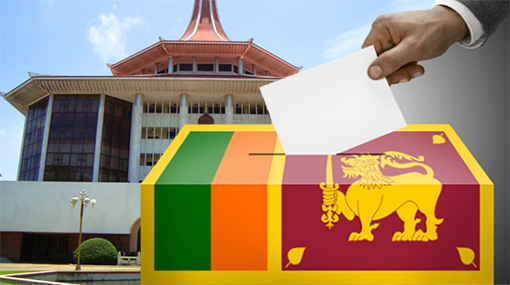Opposition political parties, except the JVP-led NPP, have appealed to the international community to exert pressure on the Wickremesinghe-Rajapaksa government to conduct the local government polls, scheduled for 09 March.
The following is the text of the letter addressed to heads of diplomatic missions in Colombo. It has been signed by General Secretary, Freedom People’s Alliance Thilanga Sumathipala, Convener Freedom People’s Congress MP Prof. G L Peiris, Leader of the Freedom People’s Congress MP Dullas Alahapperuma, Chairman Uttara Lanka Sabaghaya MP Wimal Weerawansa, Sri Lanka Freedom Party General Secretary MP Dayasiri Jayasekara, Leader Jana Jaya Front MP Anura Priyadarshana Yapa, MP Freedom People’s Front Leader Dr. Nalaka Godahewa, Sri Lanka Mahajana Party General Secretary MP Asanka Navarathne, and Uttara Lanka Sabaghaya General Secretary Dr. G. Weerasinghe: “We would like to express to you our deep concern about the unprecedented situation which has currently arisen in our country with regard to so basic a matter as the franchise of the People.
As you are aware, the time frames for the conduct of elections, at all levels -Presidential, Parliamentary, Provincial Councils, and local government authorities – are defined by the Constitution of Sri Lanka, and other applicable statutory regimes. Compliance with these requirements is mandatory, there being no flexibility or scope for exercise of discretion.
Elections have consistently taken place in our country, at regular intervals, and the nation is justly proud of its rich and vibrant democratic tradition, which is an integral part of our culture.
For the first time in our history, the government of the day has adopted the startling position that an election cannot be held because the financial resources required are not available. The implications of this will be apparent upon a moment’s reflection.
It would now seem, in accordance with the government position that it is for the incumbent administration to decide whether resources can or cannot be utilized for the holding of an election. The matter, consequently, is entirely in the hands of the government in power.
At its sole discretion, the government of the day will be entitled to postpone any election, on the ground of unavailability, or inadequacy of resources – a power which it will no doubt be tempted to exercise in any circumstances, where imminent defeat is probable.
This will inevitably result in withholding from the people their cherished right of suffrage, the source from which all other democratic rights and freedoms flow.
The funds required for the election, scheduled to be held on 9th March, 2023, have been allocated by Parliament in the Annual Appropriation Act, which was passed in December last year.
It is the imperative duty of the Secretary to the Ministry of Finance to place these resources at the disposal of the Election Commission. Failure to do so, manifestly, exposes this official to serious consequences arising from intentional violation of the Constitution.
Article 3 of the Constitution which deals with the Sovereignty of the People, makes reference to “the franchise” which has been authoritatively interpreted by the Supreme Court as including elections to local government bodies. Article 3 is entrenched by Article 83 which has the effect that the former Article can be amended, or repealed, only by a two–thirds majority in Parliament, followed by acceptance by the People at a referendum.
In Mohamed Hussain vs Election Commission of Sri Lanka, the Supreme Court observed: “Local authorities have a long history and play an important role at the grassroots level. Their functions are regulation, control and administration of all matters relating to the public health, public utility services and public thoroughfares and generally with the protection and promotion of comfort, convenience and welfare of the people and the amenities of the town or village. By delay in holding elections people are deprived of representatives who could have addressed their grievances and attended to their welfare and needs”. The Court explicitly held: “The failure to hold elections on the due date or postponing is a violation of the fundamental rights of the people”.
It is clear that every conceivable form of pressure has been brought to bear by the Executive on the Election Commission to prevent them from fulfilling their constitutional obligations. The Commission has publicly referred to more than 20 attempts by the government to thwart the holding of the election.
The result of these sustained initiatives is to erode core democratic values and to place in jeopardy the very survival of the democratic system of governance in Sri Lanka. Entrenchment of this dangerous precedent has incalculable consequences for the wellbeing of our people.
We ask Your Excellencies to bring this distressing state of affairs to the notice of your respective capitals, with a view to prevailing on the government of Sri Lanka to desist from a course of action, gravely detrimental to the nation.”


